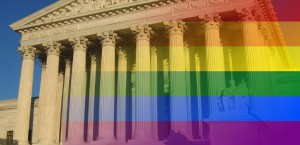Federal Judge’s Decision a Win for LGBTQ Rights and for Church/State Separation

Since the US Supreme Court’s ruling on Obergefell v. Hodges last year, marriage equality should be resolved. Yet the religious right still continues to push back against the rights of LGBTQ Americans. Red states began attempting to implement exceptions to the ruling that would allow clerks to refuse to issue marriage licenses to same-sex couples based on religious objections. These bills were touted as expanding “religious freedom” while they codified bigotry and prejudice against the LGBTQ community.
Advocates for LGBTQ rights have been fighting back, and their hard work has paid off in a recent ruling in Mississippi that prohibits clerks from refusing marriage licenses to same-sex couples on religious grounds. On June 27, US District Judge Carlton Reeves found that Mississippi’s “Protecting Freedom of Conscience from Government Discrimination Act” violated the US Supreme Court’s ruling in Obergefell. “The marriage license issue will not be adjudicated anew after each legislative session,” Reeves declared.
This ruling is cause for celebration in the humanist community as well as for the LGBTQ movement. While individuals may privately express their personal religious beliefs, employees of the state cannot use their religious convictions to discriminate against same-sex couples. Doing so would be a form of state favoritism for anti-LGBTQ religious views, in violation of the First Amendment. Overturning Mississippi’s legislation against issuing same-sex marriage licenses provides a much-needed protection for marriage equality while also upholding the separation of church and state.
However, humanists and other LGBTQ activists shouldn’t get too comfortable just yet. Mississippi Lieutenant Governor Tate Reeves has encouraged the state’s attorney to appeal the decision. Mississippi is also still waiting for the decision concerning the rest of the legislation, which allows landlords to refuse to rent to same-sex couples, doctors to deny treatment to LGBTQ individuals, businesses to reject LGBTQ customers, and employers to fire single women who become pregnant, among a whole host of other discriminatory policies. The law gives enormous power to religious groups and individuals to deny basic rights and dignity to nearly anyone whom they claim violates their beliefs. The breadth of the legislation is startling in that it seems to give free license for bigotry to nearly anyone who wants to use “religious objections” to justify their disdain for LGBTQ individuals and women.
Meanwhile, the harm done by homophobia is still fresh in the public’s mind in the wake of the horrific massacre at the Pulse nightclub in Orlando, Florida, a crime that appears to have been at least in part motivated by the shooter’s hatred for LGBTQ individuals. Yet, on June 29, #HeterosexualPrideDay became a trending hashtag on Twitter and Facebook, never mind that people have not been systematically discriminated against or denied their basic rights for being heterosexual. Homophobia, biphobia, and transphobia are sadly still alive and well in the United States and will continue to plague the LGBTQ community regardless of the status of Mississippi’s bigoted law.
Attempts at the state level to chip away the marriage rights granted to same-sex couples under the Supreme Court’s Obergefell decision must be fought vigorously by advocates for LGBTQ rights and for church/state separation. Humanists and reproductive rights groups have seen the damage that the religious right has done to abortion access under the Supreme Court’s Roe v. Wade decision, and we must not let the religious right gain similar ground in opposing marriage equality. Prejudice must not be allowed to cloak itself in rhetoric about religious liberty when it’s really being used to promote religious bigotry, and in standing against such legislation aimed at LGBTQ individuals, humanists will also be defending Jefferson’s wall separating church and state.
